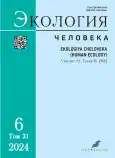Влияние установок и социальных норм на обращение за психологической помощью среди взрослого населения России
- Авторы: Ткач С.1, Одинокова В.А.1, Бурдина О.И.1
-
Учреждения:
- Санкт-Петербургский государственный университет
- Выпуск: Том 31, № 6 (2024)
- Страницы: 456-467
- Раздел: ОРИГИНАЛЬНЫЕ ИССЛЕДОВАНИЯ
- URL: https://journal-vniispk.ru/1728-0869/article/view/314521
- DOI: https://doi.org/10.17816/humeco627883
- ID: 314521
Цитировать
Аннотация
Обоснование. В России наблюдается рост психологического неблагополучия, что потенциально влечёт за собой снижение трудоспособности, качества жизни и повышенную вероятность суицидальной активности. Обращение населения за психологической помощью в России остаётся низким и требует дополнительных исследований для повышения эффективности профилактики психических расстройств и суицидального поведения.
Цель. Оценить влияние установок и социальных норм на обращение за психологической помощью среди взрослого населения России.
Материалы и методы. Исследование охватило жителей Санкт-Петербурга старше 18 лет и было проведено с использованием телефонного опроса по системе CATI. Опрос фокусировался на опыте обращения за психологической помощью и отношении к ней. Выборка, включающая 1200 человек, была репрезентативной по полу и возрасту. Репрезентативность достигалась в соответствии со статистическими данными о половозрастном составе жителей Санкт-Петербурга, представленными в сборнике Росстата. Опрос проведён в июле 2023 г. Анализ факторов, влияющих на обращение за психологической помощью, выполнен с использованием бинарной логистической регрессии.
Результаты. Выявлены ключевые факторы, влияющие на обращение за психологической помощью. К ним относятся пол, возраст, а также социальные нормы, которые проявляются в оценках распространённости обращения за психологической поддержкой среди знакомых и ожиданиях одобрения такого обращения. Кроме того, на решение обратиться за психологической помощью влияют установки, связанные с восприятием её как необходимой только для людей с заболеваниями, психическими расстройствами или высоким уровнем благосостояния.
Заключение. Результаты исследования свидетельствуют о необходимости увеличения числа обращений за психологической помощью, учитывающей специфику различных социальных групп, включая мужчин и старшее поколение. Это подчёркивает важность проведения мероприятий по дестигматизации психических расстройств и информационных кампаний, направленных на повышение осведомлённости о доступности и эффективности психологической помощи.
Ключевые слова
Полный текст
Открыть статью на сайте журналаОб авторах
Сергей Ткач
Санкт-Петербургский государственный университет
Автор, ответственный за переписку.
Email: s.tkach@spbu.ru
ORCID iD: 0000-0001-5016-9187
SPIN-код: 6740-2773
Россия, Санкт-Петербург
Вероника Александровна Одинокова
Санкт-Петербургский государственный университет
Email: v.odinokova@spbu.ru
ORCID iD: 0000-0002-9850-9109
SPIN-код: 8054-7794
канд. социол. наук, доцент
Россия, Санкт-ПетербургОльга Игоревна Бурдина
Санкт-Петербургский государственный университет
Email: o.burdina@spbu.ru
ORCID iD: 0009-0000-6638-4500
SPIN-код: 5133-6122
Россия, Санкт-Петербург
Список литературы
- Shirov AA, Nestik TA, Neverov AN, et al. Analysis of the psychological state of society and forecast of its dynamics in 2024. In: Quarterly forecast of GDP. Vol. 60. Moscow: INP RAS; 2023. P. 7–16. (In Russ.)
- Shmatova JE. Dynamics of statistical and sociological indicators of mental health of the Russian population. Problems of Territory’s Development. 2019;(3):76–96. doi: 10.15838/ptd.2019.3.101.5 EDN: MHDYHX
- Eritsyan KYu, Rusakova MM, Aleksandrova AA, Usacheva NM. Surviving a lockdown: changes in employment and psychological well-being of the population in the pandemic era. Monitoring of Public Opinion: Economic and Social Changes. 2021;(3):250–270. doi: 10.14515/monitoring.2021.3.189 EDN: UNWWNK
- Peshkovskaya AG, Galkin SA, Larionova AV, Kornetov AN. Prevalence of generalized anxiety disorder symptoms and their associations with behavioral attitudes and perception of the future in the Russian youth. Bulletin of Siberian Medicine. 2023;22(3):68–73. doi: 10.20538/1682-0363-2023-3-68-73 EDN: JIOGAD
- Wang PS, Aguilar-Gaxiola S, Alonso J, et al. Worldwide use of mental health services for anxiety, mood, and substance disorders: results from 17 countries in the WHO world mental health surveys. Lancet. 2007;370(9590):841–850. doi: 10.1016/S0140-6736(07)61414-7
- Kazantseva TV, Antonova NA, Eritsyan KYu. Help-seeking in mental health problems: conceptualization and analysis of predictors. St. Petersburg Psychological Journal. 2019;(28):88–117. EDN: TBMNMK
- Radaev VV, Ibragimova DH, Kazan AD, et al. How Russians are coping with the new crisis: socio-economic practices of the population. Moscow: Nacional`ny`j issledovatel`skij universitet «Vy`sshaya shkola e`konomiki»; 2023. (In Russ.) doi: 10.17323/978-5-7598-2756-6 EDN: WKNRCY
- Cornally N, McCarthy G. Help-seeking behaviour: a concept analysis. Int J Nurs Pract. 2011;17(3):280–288. doi: 10.1111/j.1440-172X.2011.01936.x
- Ajzen I. The theory of planned behavior. Organizational Behavior and Human Decision Processes. 1991;50(2):179–211. doi: 10.1016/0749-5978(91)90020-T
- Adams C, Gringart E, Strobel N. Explaining adults’ mental health help-seeking through the lens of the theory of planned behavior: a scoping review. Syst Rev. 2022;11(1):160. doi: 10.1186/s13643-022-02034-y
- Antonova NA, Eritsyan KYu, Kazantseva TV, Dubrovsky RG. Barriers and facilitators to seeking psychological assistance in school education system. Psychological Science and Education. 2022;27(4):77–87. doi: 10.17759/pse.2022270408 EDN: RBXHDJ
- Eritsyan K, Antonova N, Kazantseva T, Usacheva N. Association between descriptive and injunctive norms and students’ intentions to seek support from mental health services. Counselling and Psychotherapy Research. 2021;21(4):827–836. doi: 10.1002/capr.12461
- Anikina VO, Popova AG, Vasilyeva NL. What stops men from seeking psychological help? World of Science. Pedagogy and psychology. 2020;8(5):26. EDN: KXZKTI
- The main indicators of demographic processes in St. Petersburg in 2022: A statistical collection. St. Petersburg: Petrostat; 2023. 90 p. (In Russ.)
- Cheng HL, Wang C, McDermott RC, et al. Self-stigma, mental health literacy, and attitudes toward seeking psychological help. Journal of Counseling & Development. 2018;96:64–74. doi: 10.1002/jcad.12178
- Türküm AS. Who seeks help? Examining the differences in attitude of Turkish university students toward seeking psychological help by gender, gender roles, and help-seeking experiences. The Journal of Men’s Studies. 2005;13(3):389–401. doi: 10.3149/jms.1303.389
- Gough B, Novikova I. Mental health, men and culture: how do sociocultural constructions of masculinities relate to men’s mental health help-seeking behaviour in the WHO European Region? Copenhagen: WHO Regional Office for Europe; 2020 (Health Evidence Network (HEN) synthesis report 70).
- Topkaya N. Factors influencing psychological help seeking in adults: a qualitative study. Educational Sciences: Theory and Practice. 2015;15(1): 21–31. doi: 10.12738/estp.2015.1.2094
- Mackenzie CS, Gekoski WL, Knox J. Age, gender, and the underutilization of mental health services: The influence of help-seeking attitudes. Aging Ment Health. 2006;10(6):574–582. doi: 10.1080/13607860600641200
- Plutov LE, Rusakova MM, Guzeva DV. Digitalization of psychological help: factors and trends (the case of St. Petersburg). Sotsiologicheskie Issledovaniya. 2023;(7):53–62. doi: 10.31857/S013216250023035-1 EDN: PKIXSS
Дополнительные файлы







